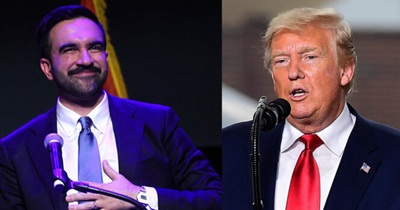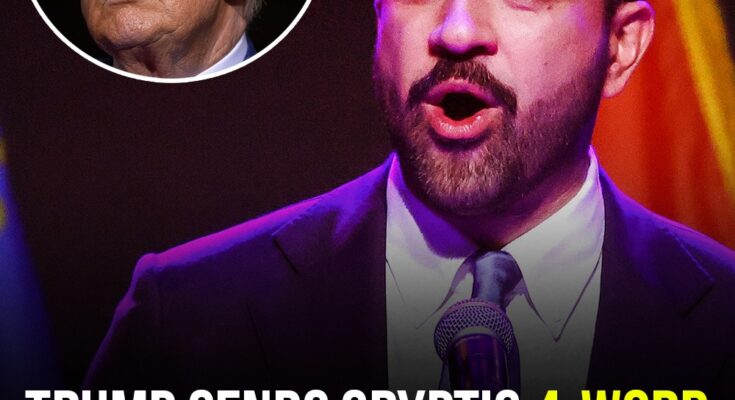
In a historic and unprecedented moment for New York City, Zohran Mamdani has emerged victorious in the 2025 mayoral race, reshaping the city’s political landscape and making history as both the first Muslim mayor and the first mayor of South Asian heritage.
His win, celebrated by thousands of supporters across the city, marks a turning point not only for New York politics but also for the broader national conversation on diversity, representation, and progressive leadership in urban governance.
The mayoral election, which saw a record voter turnout exceeding two million ballots, produced a decisive victory for Mamdani.
The 34-year-old candidate secured more than 1.03 million votes, surpassing the combined totals of his primary opponents, former governor Andrew Cuomo and Republican Curtis Sliwa.
Analysts have described the outcome as a landslide, highlighting Mamdani’s ability to build a broad coalition that cut across demographic and political lines in one of the most complex and diverse cities in the world.
Political observers have pointed to Mamdani’s grassroots campaign, focused on housing equity, education reform, and climate initiatives, as a major factor in his success.
His appeal to younger voters, immigrant communities, and progressives disillusioned with traditional political figures contributed to a surge of engagement, particularly in neighborhoods that historically had lower turnout rates.
The Pre-Election Tensions with Trump
Even before the election, tensions between Mamdani and former President Donald Trump were palpable.
Trump, whose deep roots in New York City include decades of business and political connections, had publicly criticized Mamdani, repeatedly labeling him a “pure communist.”
In a June interview with Fox News, Trump described a potential Mamdani victory as “inconceivable” and questioned the feasibility of his leadership in America’s largest city.
Ahead of the vote, Trump escalated his warnings on his social media platform, Truth Social, explicitly threatening to withhold federal funds from the city should Mamdani win. In one post, Trump wrote:
“Whether you personally like Andrew Cuomo or not, you really have no choice. You must vote for him and hope he does a fantastic job. He is capable of it, but Mamdani is not!”
He followed this warning with another statement:
“If Communist Candidate Zohran Mamdani wins the Election for Mayor of New York City, it is highly unlikely that I will be contributing Federal Funds, other than the very minimum as required, to my beloved first home.”
Trump’s statements heightened the stakes of the election, creating a charged political atmosphere where both local and national attention was focused on the results.
Many political analysts interpreted the comments as both a warning to voters and a potential prelude to federal interference in the city’s governance, depending on the outcome.
Victory Speech Sends a Message
Following the official announcement of his win on November 4, Mamdani delivered a speech that resonated deeply with his supporters and quickly captured national attention.
In his address, he celebrated New York City’s immigrant heritage, emphasizing that the city’s identity is intrinsically tied to the contributions of people from around the world:
“New York will remain a city of immigrants, a city built by immigrants, powered by immigrants, and as of tonight, led by an immigrant.”
Mamdani did not shy away from addressing the former president directly, signaling a willingness to confront political challenges head-on. In front of a roaring crowd, he issued a pointed statement to Trump:
“If anyone can show a nation betrayed by Donald Trump how to defeat him, it is the city that gave rise to him.”
He then delivered four words that immediately went viral, demonstrating both defiance and confidence:
“Donald Trump, since I know you’re watching, I have four words for you: turn the volume up!”
Observers have interpreted this as a clear signal that Mamdani is prepared for a politically combative term, particularly in light of Trump’s past criticism and threats.
Trump’s Cryptic Response
Trump responded to Mamdani’s victory with a cryptic post on Truth Social, writing:
“…AND SO IT BEGINS!”
The message, brief but ominous, has sparked intense speculation among political commentators and New York residents alike.
Many believe Trump’s post could signal the initiation of political maneuvers aimed at challenging Mamdani’s authority, potentially including efforts to withhold federal funding or leverage federal oversight.
Others suggest the post is a symbolic warning, intended to rally Trump’s base and demonstrate continued engagement in New York City politics despite no longer holding office.
Legal experts have noted that any federal attempt to block funds or interfere with municipal governance would likely face significant legal challenges.
Nonetheless, the post underscores the tense relationship that is likely to define interactions between Mamdani’s administration and federal authorities in the coming months.
National and Local Reactions
Mamdani’s victory has elicited a broad spectrum of reactions, both celebratory and critical.
Supporters have hailed his win as a transformative moment, particularly for immigrant communities and progressive voters, while critics have raised concerns about his policy proposals and potential clashes with federal leadership.
Prominent progressive leaders praised Mamdani’s win as an inspiring example of political engagement and inclusivity. “
Zohran Mamdani’s election is a historic milestone not just for New York, but for the entire nation,” said one advocacy leader.
“It shows that diverse voices can rise to positions of leadership in even the most complex and high-stakes political environments.”
Conversely, conservative commentators have questioned Mamdani’s ability to govern effectively in a city facing challenges such as rising housing costs, public safety concerns, and economic inequality.
Trump supporters, in particular, have voiced skepticism about Mamdani’s progressive agenda, highlighting the former president’s past warnings and portraying the mayor-elect as ideologically extreme.
Looking Ahead: Policy and Challenges
Mamdani’s campaign focused heavily on progressive priorities, including affordable housing initiatives, comprehensive education reform, climate resilience projects, and improving public transportation.
Analysts anticipate that his administration will immediately face scrutiny over budget allocation, federal funding negotiations, and the implementation of ambitious policy goals.
Given Trump’s prior threats regarding federal funding and the possibility of political confrontation, Mamdani’s early months in office are expected to be particularly challenging.
Political observers note that navigating these dynamics will require careful coalition-building within the city council, strategic engagement with federal authorities, and clear communication with constituents to maintain public support.
Broader Implications for U.S. Politics
Mamdani’s victory has broader implications beyond New York City.
As one of the nation’s largest and most influential urban centers, the mayoralty serves as a high-profile platform for progressive leadership and a potential model for other cities across the United States.
Analysts suggest that the outcome may influence national Democratic strategies, inspire progressive candidates in other regions, and contribute to debates about federal-local relations in politically polarized environments.
At the same time, Trump’s continued vocal presence in New York politics underscores the potential for ongoing conflict between municipal and federal leadership, with national observers closely monitoring every development.
The relationship between Mamdani and Trump could set precedents for how future mayors and federal authorities interact, particularly in situations where political ideology diverges sharply.
Conclusion
Zohran Mamdani’s election as New York City mayor represents a historic moment that combines progressive triumph, immigrant representation, and a direct challenge to the entrenched political order.
The reaction from Donald Trump—cryptic, foreboding, and widely analyzed—adds an additional layer of complexity to an already pivotal moment in urban and national politics.
As Mamdani prepares to assume office, all eyes will remain on New York City to see how the new administration navigates policy priorities, potential federal challenges, and the expectations of a diverse and politically engaged electorate.
One thing is certain: the political landscape of New York City—and potentially the nation—has entered a new era, and the coming months will likely define not only Mamdani’s legacy but also the future interplay between local and federal governance in America’s largest cities.



